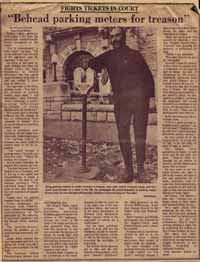Ran into this guy in a late-night coffee shop where he was bragging about his court case. I didn’t think much of it at the time but checked out his court appearance next morning. I’m glad I did. This was a national release on the Canadian Press wire.
Behead parking meters for treason!
Nelson Daily News
Oct. 17 1975

Human rights advocates coud learn a lot form the likes of John Alfred Fenwick-Jones, freedman of the realm.
“I’m a revolutionary in some ways,” he says, “but not by violence. I use the tools of the oppressor and the oppressor is the law.”
His tools in this case, include nothing less than the Magna Carta, the legal foundation of British democracy that was signed under duress by King John in 1215 and ratified 10 years later by Henry II.
The oppressor is the lowly parking meter. “I’ve had a pet aversion to parking meters ever since I can remember,” says Fenwick-Jones, emitting a joyful, heaving belly-laugh highly reminiscent of baying bloodhounds, hot on the trail. He’s never paid a parking ticket in his life, though he has 11 outstanding fines collected in Nelson. He’s never put money in a parking meter, either.
And in provincal court Thursday, he told Judge R. B. Allan why. Collecting money from parking meters is treason, he said, and he doesn’t want to be an accessory.
“You could behead a marking meter,” he said in an interview later. “That’s the penalty for treason.”
And in court Thursday, she showed how serious he was.
“I’m here because I have a desire to be a Canadian, and to live up to the rights and responsiblities of being a Canadian,” he said in his defense summary. “I’m convinced there’s been an error in law… that threatenes the very existance of Canada iteslf.”
Seldom have the judicial feathers been so ruffled.
Crown proesecuror Lee Portous said Fenwick-Jones’ defence challenges the constitutionality of the Municipal Act, the authority of the provincial legislature and the British North America Act.
The attorney-general should be notified as to constitutional rguments, she said.
Judge Allan ordered the case remanded until Nov. 14, giving the Crown atttorney’s office time to prepare for the case.
The rationale behind Feniwck-Jones defense runs something like this:
The Magna Carta, which licences theBritish Parliament, guarantees freedmen and merchants free access to the highways, byways and rivers of the realm. The nobles and barons that presented King John with that document in 1215 just about tore his left arm off before he would sign,” said Fenwick-Jones. But Henry II affirmed the document of his own free will in 1225 and its been affirmed by every monarch ever since.
Fenwick-Jones happens to be a freedman of the realm because, he told the court, he is the oldest son of his London-born father, and served in the army detachment of William Lyon Mackenzie King’s funeral, which is the equivalent of servce as a castle guard.
But the same privileges apply to those who are not freedmen, thanks to amendments to the charter written in 1643 by Sir Howard Coke, extending the privileges to everybody.
The British North America Act in 1867, and the 1931 Statute of Westminister which gave Canada’s parliament the same autonomy as the British Parliament, trace their lineage directly to the Magna Carta, said Fenwick-Jones.
Both Canadian and British parliaments are licencesed by the Magna Carta, said Fenwick-Jones, and it cannot be revoked.
Parking meters contravene Articles 41 and 42 of the Magna Carta, which guarantees free access to public roads, he contends.
So when charged with parking violations, he refused to state “guilty” or “not guilty”, entering instead a plea of right in defence of the crown, the realm and the dominion of Canada.
Much the same plea was entered by Charles I who was charged before Oliver Cromwell with usurping the authority of parliament, he said.
Charles I got beheaded.
The court entered his pleas as “not guilty”.
In order to base his defence on the refusal to comply with a treasonous act, he says, he had to swear an oath of allegiance to the Crown, voluntarily surrender harms and place himself as a hostage before the Crown.
He says he dug up a World War I British .303 calebre rifle, which he surrendered at the sherrif’s office. He also signed an affidavit certifying his allegiance, and turned himelf in as a hostage to the Crown. For the duration of the trial, he says, “They can do anything they want with me.”
So far, the Crown has left its hostage alone.
“I have a great inerest in English history and law,” he told the court. “English law is the only law in the world that guarantees justice, not law.”
He cites article 40 of the Magna Carta: “to no one will we sell, to no one deny or delay a right or justice.”
The Magna Carta guarantees 64 rights, he said later, and all but eight are gone. “They’ve been exchanged for an illusion of security but the illusion gets pretty thin at times.”
He says some of our lost rights include the right to fish in any waters, the right to free and unfettered use of lands, protection from income tax, first instituted as a war measure in 1971 and the right to bear and use arms in defence of those rights.
But worse, “our identity’s been lost,” Citizens are no longer aware of their rights and responsibilities, he says.
He’s spent about $500 preparing for his trial, he says, but if he wins, parking meters won’t be forced out of business. In all probability, they’ll make parking revenue a legal tax by modifying the meters to issue receipts, he says.
But there are other rewards. If the court decides in his favor, he may become a Knight Protector of the Realm, according to medieval tradition.
Don Quixote would be proud.